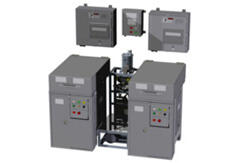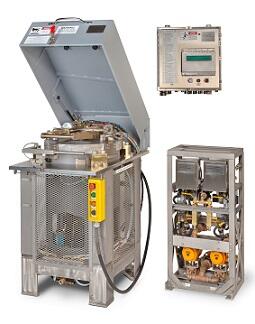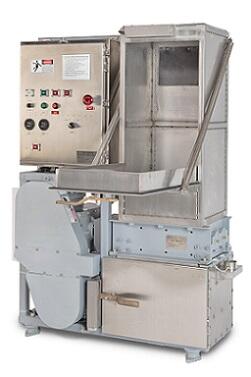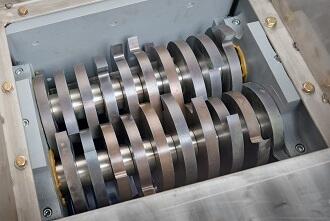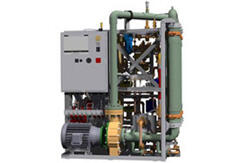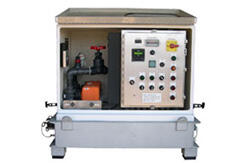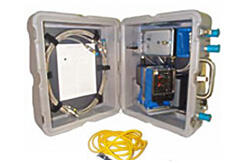Ocean & Marine Systems
Leidos develops marine products to meet today's challenges. These products monitor global climate change and marine meteorology, chart and analyze hydrographic data, and help to manage waste and control pollution.
Generic Sensor Format
GSF is designed to efficiently store and exchange information produced by geophysical measurement systems before it has been processed into either vector or raster form.
Generic Sensor Format has become a standard file format for bathymetry data and is widely used in the maritime community. This single-file format is one of the U.S. Department of Defense Bathymetric Library (DoDBL) processing formats. GSF is configuration managed by Leidos. Change management is overseen by a configuration control board that maintains final approval authority for updates to GSF. GSF is designed to efficiently store and exchange information produced by geophysical measurement systems before processing into either vector or raster form. The structure is particularly useful for data sets created by systems such as multibeam echosounders that collect a large quantity of data. GSF is designed to be modular and adaptable to meet the unique requirements of a variety of sensors.
Objectives
GSF is designed to efficiently store and exchange information produced by geophysical measurement systems before processing into either vector or raster form. The structure is particularly useful for data sets created by systems such as multibeam echosounders that collect a large quantity of data. GSF is designed to be modular and adaptable to meet the unique requirements of a variety of sensors.
- Portability among all major computing platforms
- Efficiency in terms of storage volume and data access
- Consistency with other DoDBL formats
- Measurements can be easily incorporated
- Endorsement by the major groups of users outside the DoDBL
The GSF format, and code to read it, is updated to keep current with new technologies and uses. New releases of the GSF library are generally made once or twice each year. However, the frequency of updates to GSF in any particular year depends on technology advances and community requests for updates to GSF. New GSF releases provide an expansion of capability while striving to preserve all previous capability. A formal change request, approval, and release management process is followed for all updates made to the format and the access library. By downloading and using the GSF distribution, you consent to use an approved distribution obtained from this web site. Parties interested in an update to the library are encouraged to provide their request through the registration link provided below. A GSF version release includes the following items:
- GSF specification documentation
- GSF change request documents summarizing the approved updates for this release
- GSF library (GSFlib) documentation
- Source code that comprise the GSF library (C language source code)
GSF Release Versions
-
GSFv03.11, released March 11, 2025 is a maintenance release that includes:
- Various Bug Fixes
-
GSFv03.10, released July 11, 2024 is a maintenance release that:
- Added support for the Kongsberg ME70 sonars
- Added new data fields to support backscatter processing of data sourced from KMALL
- Improved the overall robustness of the library.
-
GSFv03.09, released April 29, 2019 is a maintenance release that:
- Added support for the Kongsberg sonars using the KMALL format.
- Added support for storing compressed GSF files.
- Improved the overall robustness of the library.
-
GSFv03.08, released November 19, 2018 is a maintenance release that:
- Added support for the Reson T-Series sonars.
- Added 9 new vertical datums.
- Fixed the initialization of the GSF processing parameter records.
- Improved the overall robustness of the library.
-
Released June 31, 2016 is a maintenance release that corrected a problem with corrupting index files when appending to them.
-
Released June 30, 2014 is a maintenance release that:
- Fixed issues with the 64 bit support to prevent redefinition of 64 bit macros from the standard library.
- Fixed memory issue with appending index files with a lot of scale factor records.
-
Released May 2, 2014 is a maintenance release that:
- Updated to support GSF files larger than 2 GB.
- Added support for EM2040 sonars.
- Updated to handle GSF files collected in the local time zone.
-
Released June 15, 2012 is a maintenance release that:
- Corrects problems with encoding and decoding the two-bit quality flags array
- Corrects a problem with indexing a partial record at the end of the file
- Explicitly declares certain function arguments as constant
- Provides a new function for accessing the gsfError value
-
Released November 18, 2011 is an enhancement that:
- Adds support for Kongsberg EM12 multibeam systems
- Adds support for R2Sonic multibeam systems
- Adds several additional parameters to the processing parameter record
- Adds additional uncertainty fields to the navigation uncertainty record
- Resolves a problem with encoding and decoding 12 bit imagery
-
Released October 1, 2010 is an enhancement that:
- Adds new query functions to provide specific information on the contents of the source data
- Adds support for Kongsberg EM2040
- Adds support for Imagenex Delta-T
- Adds several additional parameters to the processing parameter record
- Adds additional uncertainty fields to the navigation uncertainty record
- Resolves problems with removal of temporary files used to create index file
-
Released April 27, 2009 is an enhancement that adds support for GPS-based Vertical Control, the RESON 7125, and the Kongsberg EM2000.
-
Released June 05, 2008 is an enhancement release that adds support for bathymetry data from the Klein 5410 interferometer.
-
Released December 10, 2007 is a maintenance update that provides resolution of reported problems.
Pure File Magic
PFM is designed to efficiently store bathymetric data and generate various representations of the data ("surfaces") for editing, display, and analysis.
Pure File Magic is a file format for bathymetric data that is becoming more widely used in the maritime community. PFM is presently configuration-managed by the U.S. Naval Oceanographic Office (NAVOCEANO). PFM is designed to efficiently store processed soundings (after all corrections have been made for tides, draft, vessel offsets, etc.) and allow rapid editing of data outliers. The various "surfaces" (binned data) created from the soundings are used both as a quality assurance tool to find outliers as well as to display the data for analysis.
Objectives
Final PFM surfaces may then be exported in various formats for use by other software packages. The structure is particularly useful for data sets created by systems such as multibeam echosounders that collect a large quantity of data.
- Portability among all major computing platforms
- Efficiency in terms of storage volume and data access
- Allow rapid identification and editing of data outliers (by user-developed software)
New releases of the PFM library are generally made as new functionality is added or significant bug fixes are made. New PFM releases provide an expansion of capability while striving to preserve all previous capability. By downloading and using the PFM distribution, you consent to use an approved distribution obtained from this web site. Parties interested in an update to the library are encouraged to provide their request through the registration link provided below. A PFM version release includes the following items:
- PFM specification documentation
- PFM library (PFMlib) documentation
- Source code that comprise the PFM library (C language source code)
PFM Release Versions
-
Released May 11, 2018 and includes changes between PFM 6.30 to 6.40 (Prevented orphaned file descriptors during error conditions. Fixed buffer overflows and invalid reads when bit packing. Added checks for corrupt PFM files.)
-
Released June 21, 2012 is the first official release through this web site.
Solid & Liquid Waste Management
Our Engineering and Manufacturing Department supplies shipboard solid waste (disposal) equipment and oily waste (ultrafiltration) polishing systems for Navy surface ships. We also manufacture and supply chlorinators, which submarines utilize while in port to suppress marine growth in their seawater piping. We provide installation, start-up, troubleshooting, field support, and training. We also provide spare and replacement parts, on-board service and refurbished units.
Products
-
We provide the U.S. Navy's Plastics Waste Processor (PWP), which compresses shipboard generated plastic waste into a dense, sanitary disk 20 inches in diameter suitable for long-term storage.
Applications
The Plastics Waste Processor is designed to handle incidental materials that may be combined with, or contain, plastic components that cannot be processed in the normal solid waste stream.
Features
The PWP system consists of two primary components, the Compress Melt Unit and the Plastics Shredder. Other components are the Closed Loop Cooling Unit (CLCU) or Auxiliary Unit to cool the CMU and a Heat Sealer, which seals odor barrier bags used to store the plastic disks on board ship.
-
The CMU is the principal component of the plastics waste processor. This "heated compactor" converts shredded, plastic waste into a dense disk, that is heat sealed into an odor barrier bag which is then suitable for long-term storage. It can process lightly contaminated food as well as clean plastic. The CMU is designed to handle other materials that may be combined with, or contain, plastic components that cannot be processed in the normal solid waste stream. We also refurbish the CMU in accordance with a technical repair standard.
Technical Specifications
- Processing Rate: Completed plastic disks reduce plastic volume by 30 to 1. Each CMU processes a 10-pound disk every 45 minutes
- Power Requirements: 460 VAC
- Overall Weight: 1,310 pounds
Parts
View illustrated parts breakdowns with part numbers to assist in ordering replacement parts.
-
The modified plastics waste processor, CMU (MOD 1 PWP), was designed to significantly improve upon the performance of the original unit by increasing processing rates and reliability and decreasing maintenance. The new unit has 34% less components, provides 2 to 3 times the process rate and is significantly cleaner and easier to clean. The electromechanical drive system was replaced with a single pneumatic actuator for compression, and the lower frame of the unit was redesigned to be more open, allowing easier access for cleaning as well as more efficient waste and liquid flow through.
The unit also incorporates nine self-cleaning nozzles that are connected to the ship's hot potable water service. This greatly reduces the amount of cleaning time and effort by ship's force. The new direct cooling system used with the auxiliary unit does not need a pump or a heat exchanger and has a total of 84% fewer parts than the current closed-loop cooling unit. The direct cooling system utilized by the auxiliary unit also cools the compress melt unit in about half the time of the original cooling system.
All of the improvements are internal to the equipment, resulting in zero ship interface changes, and the Mod 0 unit can be replaced by the Mod 1 unit on the same foundation with no alterations or modifications required.
Technical Specifications
- Processing Rate: Completed plastic disks reduce plastic volume by 30 to 1. Each CMU processes a 10-pound disk every 20 minutes
- Power Requirements: 460 VAC
- Overall Weight: 1,310 pounds
Part List
View illustrated parts breakdowns with part numbers to assist in ordering replacement parts.
-
The pulpers were designed for shipboard use on U.S. Navy vessels. They are key elements in the Marine Pollution Controls systems for shipboard solid waste management to meet the Act to Prevent Pollution from Ships ("APPS") and MARPOL (Marine Pollution) Annex V. A pulper processes food, cardboard and paper waste (including classified documents) into a non-floating slurry that discharges overboard. The small pulper is intended for smaller size ships that do not have the space or require the high processing capability of the large pulper.
Applications
Both pulpers are designed to resist damage if trash sorting errors occur and metal, glass, or other non-pulpable materials are placed into the unit. Metal and glass debris that may not have been sorted before it was loaded into the pulper are separated from the slurry by means of gravity, forced to the bottom of the tank and collected in a "junkbox," which is emptied manually after the pulper is shut down. Plastic items inadvertently loaded into the pulper are partially shredded and retained within the pulping chamber. They are removed manually after the unit is shut down.
Technical Specifications
- Large Pulper
- Processing Rate:
- 500 pounds (227 kg)/hr paper and cardboard
- 1000 pounds (454 kg)/hr food waste
- 680 pounds (304 kg)/hr mixed waste
- Overall Weight: 2,800 pounds
- Processing Rate:
- Small Pulper
- Processing Rate:
- 100 pounds (45 kg)/hr paper and cardboard
- 200 pounds (91 kg)/hr food waste
- 140 pounds (64 kg)/hr mixed waste
- Overall Weight: 755 pounds
- Processing Rate:
Part List
View illustrated parts breakdowns with part numbers to assist in ordering replacement parts.
- Large Pulper
-
Leidos provides the U.S. Navy Solid Waste Shredder, which processes either shipboard plastics or metal and glass into shredded pieces either for additional processing. The shredder is part of the solid waste processing technology to meet the Act to Prevent Pollution from Ships and MARPOL Annex V. The solid waste shredder is designated as a plastics shredder for plastic waste use, and as a metal and glass shredder for metal and glass. The solid waste shredder is designed to un-jam itself if hard to process or un-shreddable objects are encountered.
Technical Specifications
- Processing Rate:
- 50 pounds (113 kg)/hr metal and glass
- 80 pounds (36 kg)/hr plastics
- Footprint: 60" L, 42" W, 79' H
- Power Requirements: 460 VAC
- Overall Weight: 1,310 pounds
Part List
View illustrated parts breakdowns with part numbers to assist in ordering replacement parts.
- Processing Rate:
-
The UF 1001 10 GPM oily waste polishing unit utilizes ultrafiltration technology to reduce the oil in water content of Oily Waste System (OWS) effluent to less than 15 parts-per-million (ppm) meeting U.S. Coast Guard (USCG) and MARPOL Annex V discharge requirements. This unit is a vital marine pollution abatement system in processing emulsified bilge water to an acceptable effluent quality level.
The polisher works in conjunction with the standard gravity separation oil pollution abatement equipment and is the final treatment step for bilge water before it is discharged overboard. The polisher is designed for installation as modules for backfit on existing ships or can be installed as an assembled unit for new construction.
Technical Specifications
- Processing Rate: 10 gallons per minute
- Footprint: 60" L, 42" W, 79' H
- Power Requirements: 460 VAC
- Dry Weight: 3,280 pounds
- Wet Weight: 3,950 pounds
-
Biofouling of shipboard seawater cooling systems can degrade the heat transfer performance of heat exchangers, cause flow restriction, and add significant downtime for system and component cleaning. Leidos and the Naval Research Laboratory developed the Leidos Topside Chlorinator/Dechlorinator Ensemble (AN/TSQ-218 and AN/PSQ-11) to treat the auxiliary and main seawater systems on U.S. Navy submarines while in port.
Applications
The chlorinator is intended for use on SSN 688 and Trident Class submarines to service the Auxiliary Sea Water (ASW) heat exchangers. The unit was designed to function directly from the deck of a submarine or use shore power.
Features
Our chlorinator produces a small amount of sodium hypochlorite from seawater that is injected into the seawater cooling system to prevent biological fouling.
Benefits
The Topside Chlorinator uses electrolytic chlorination to create the chlorine, which controls biofouling and greatly reduces the requirement for seawater system component cleaning. The below deck installed Dechlorinator works in conjunction with the Topside Chlorinator to satisfy both federal and state regulations for the discharge of chlorine to aquatic environments.
Technical Specifications
- Processing Rate: 1/2 lb/hr of sodium hypochlorite
- Footprint: 46" long, 32" deep, 39" high
- Power Requirements: 440 Vac, 20A, 60Hz, 3-phase
- Overall Weight: Approximately 400 pounds
-
The Dechlorinator unit AN/PSQ-11(V) Model 5SXB (for surface ships) operates in conjunction with permanently installed seawater biofouling chlorine injection systems used to service high volume A/C condensers and firemain systems.
The Dechlorinator unit, AN/PSQ-11(V) Model 5U1A (for submarines) operates in conjunction with the Topside Chlorinator to ensure zero discharge of chlorine. The Dechlorinator controls the chlorination process and interlocks with the Topside Chlorinator systems.
Applications
Our Ship Dechlorinator works in conjunction with Leidos' or any other Topside Chlorinator to satisfy both federal and state regulations for the discharge of chlorine to aquatic environments.
Benefits
The Leidos Dechlorinator unit is manufactured from specially selected, MIL-SPEC components, assembled and packaged to withstand the rugged shipboard and dockside environment. It is portable and easily deployed, operated and stored on ship or dock.
Technical Specifications
- Models
- For Submarines: AN/PSQ-II (V) Model 5U1A
- For Surface Ships: AN/PSQ-II (V) Model 5SXB
- Footprint: 21" long x 10" deep x 18" high
- Power Requirements: 110Vac, 10A, single-phase shipboard type I power
- Overall Weight: Approximately 30 pounds
- Portability: Built into a suitcase for ease in below deck installation
- Chemistry: Sodium metabisulfite powder mixed with potable water to become sodium bisulfite
- Injection: Injection rate adjusted in situ and based on chlorine production rate. Injection into the discharge line of the seawater system
- Models
